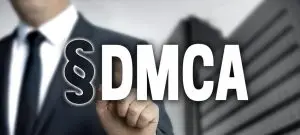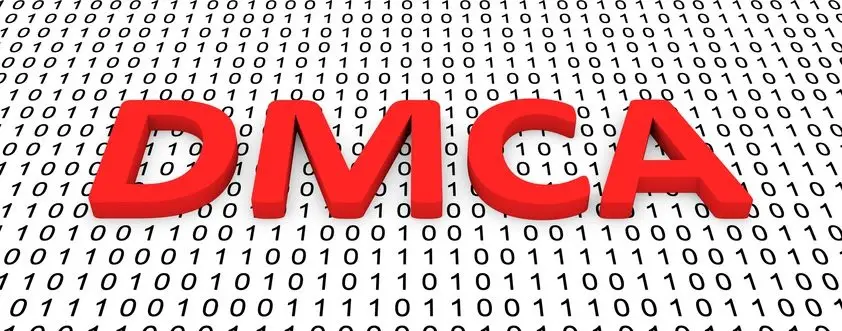E-Commerce, Amazon & the DMCA
One of the most popular activities that occurs online is shopping. Online shopping offers many advantages when compared to traditional “brick and mortar” stores; you can shop at home, dressed however you please, and do it all at any time of the day. This process, of buying and selling products and services via a secure connection and using electronic payment has come to be known as electronic commerce, or e-commerce. Amazon and eBay are considered by many to be the founders of the modern e-commerce platform. Amazon was created in 1994 by Jeff Bezos, originally solely as an online book store.[1] Today Amazon provides a platform for third party sellers to supply virtually any product they want to their customers, including books, movies, electronics, home goods, and groceries. Disputes on e-commerce platforms involving copyright (as well as other types of intellectual property) infringement have become increasingly prevalent over the last several years, and due to the rapid growth of the industry it seems that copyright law is struggling to keep up.

In 1998, Congress enacted Title II of the Digital Millennium Copyright Act (DMCA).[2] “The Online Copyright Infringement Liability Limitation Act (“OCILLA”), codified in § 512, protects qualifying internet service providers (“ISPs” or “service providers”) from liability for monetary relief for direct, vicarious, and contributory infringement and, often, from injunction where infringing or allegedly infringing materials are carried on the system without the knowledge and involvement of the service provider.”[3] The definition of ISP is broad, and includes e-commerce websites such as Amazon, eBay, and Alibaba. The purpose of the DMCA in the words of congress was to address “the controversial questions of copyright liability in the online world.”[4] However, in reality we are faced with issues that the DMCA did not anticipate, specifically across many e-commerce platforms. The DMCA requirements have forced the hands of e-commerce platforms in shaping their respective policies for handling copyright infringement. The Amazon platform refuses to assess the validity of intellectual property complaints. On Amazon, if an allegation is made against a seller’s account, Amazon will immediately remove the accused seller’s privilege to sell on the platform.
What Does the DMCA Offer?

The DMCA offers what is known as the DMCA safe harbor provisions, and while not a total defense, these provisions provide a shield for internet service providers who qualify and normally would be held contributorily or vicariously liable for copyright violations.[5]
The DMCA outlines requirements for service providers who wish to be protected by the safe harbor provisions in §512(c).[6] For example, when a service provider receives a takedown notice (official notice of an infringement allegation) from a copyright owner, they are required to “expeditiously remove or disable access to the infringing material.”[7]
How Does the DMCA Affect Amazon Sellers?
 Amazon’s implementation of the DMCA through their policy ultimately results in countless seller account suspensions every week.
Amazon’s implementation of the DMCA through their policy ultimately results in countless seller account suspensions every week.
Intellectual property complaints have skyrocketed on the platform likely due to manufacturers success in getting small sellers “kicked off.”[8] For example, imagine a hypothetical seller who is buying yoga pants at their local Wal-Mart off of the discount rack and subsequently selling them on Amazon. In addition, this seller is able to sell the pants at greater margins than Wal-Mart could.[9] Wal-Mart’s brand management division is able to file a complaint with Amazon for copyright infringement and can immediately get this small seller’s account privileges removed. In reality there is no copyright infringement, but now the burden is on the “little-guy” so to speak, to appeal to Amazon for their account reinstatement.[10] This often requires a lawyer because most sellers are unfamiliar with intellectual property law. What makes it even more difficult is that Amazon actually requires the complainant to rescind their complaint before they are willing to reinstate the sellers account. Without a lawyer to contact the rights owner on their behalf and explain the facts and circumstances surrounding the application of the law, a layman is unlikely to succeed in getting their account reinstated on their own. In addition, the process of getting reinstated can sometimes take up to two weeks or in some situations, even longer.[11]
 This “hijacking” of a sellers listing is very similar to what congress has recognized in other contexts as trademark bullying.[12] Only here we are dealing with e-commerce business practices and copyright complaints. Trademark bullying can be defined “as the vexatious practice of a trademark [or here, a copyright] owner that uses its trademark [or copyright] rights to harass and intimidate another business beyond what the law might be reasonably interpreted to allow.”[13] Essentially, on the Amazon platform, sellers are victimized by this bullying and are usually forced not only to hire an attorney for help, but lose profits every day that they are fighting to get reinstated.[14] It is common for successful third party sellers on the Amazon platform to make most of, or even all their income from their business on the platform, and because suspensions can sometimes take weeks to resolve, a baseless complaint can result in significant profit losses for e-commerce entrepreneurs.[15]
This “hijacking” of a sellers listing is very similar to what congress has recognized in other contexts as trademark bullying.[12] Only here we are dealing with e-commerce business practices and copyright complaints. Trademark bullying can be defined “as the vexatious practice of a trademark [or here, a copyright] owner that uses its trademark [or copyright] rights to harass and intimidate another business beyond what the law might be reasonably interpreted to allow.”[13] Essentially, on the Amazon platform, sellers are victimized by this bullying and are usually forced not only to hire an attorney for help, but lose profits every day that they are fighting to get reinstated.[14] It is common for successful third party sellers on the Amazon platform to make most of, or even all their income from their business on the platform, and because suspensions can sometimes take weeks to resolve, a baseless complaint can result in significant profit losses for e-commerce entrepreneurs.[15]
This note aims to argue that amending the DMCA specifically regarding its application in the e-commerce context will ultimately help to combat copyright bullying and provide the most fair environment for e-commerce to take place. Part II will begin with a discussion of copyright infringement and the DMCA.
This series of articles shall address the following:
Part I Copyright Infringement and the DMCA where Amazon sellers can learn about the purposes of the DMCA, the DMCA safe harbor provision and the DMCA notice and takedown procedures.
Part II Amazon Background, Policies and Addressing Suspensions. Part II discusses what Amazon sellers face on the Amazon platform. Amazon’s policies as well as the typical procedure for getting a seller reinstated after a copyright complaint has been made against them.
Part III Proposed Changes to the DMCA. In Part III, we provide recommendations for amending the DMCA in ways that would benefit Amazon sellers, Amazon and consumers.
Amazon & the DMCA
[1] Jillian D’Onfro & Eugene Kim, The Life and Awesomeness of Amazon founder and CEO Jeff Bezos, Business Insider (Feb. 11, 2016) http://www.businessinsider.com/the-life-of-amazon-founder-ceo-jeff-bezos-2014-7/.
[2] Digital Millennium Copyright Act of 1998, 17 U.S.C. § 512 (2016).
[3] Debra Weinstein, Note, Defining Expeditious: Uncharted Territory of The DMCA Safe Harbor Provision: A Survey of What We Know and Do Not Know About the Expeditiousness of Service Provider Responses to Takedown Notifications, 26 Cardozo Arts & Ent L.J. 589 (2008).
[4] See; Ellison v. Robertson, 357 F.3d 1072, 1076 (9th Cir. 2004).
[5] Weinstein, supra note 3.
[6] 17 USCS § 512
[7] Id.
[8] Leanna Kelly, Amazon Lawyer’s Expert Insight into Amazon Seller Account Suspensions, CPC Strategy (August 10, 2016), http://www.cpcstrategy.com/blog/2016/08/amazon-seller-account-suspensions-qa/.
[9] Id.
[10] Id.
[11] Id.
[12] Leanna Kelly, Amazon Lawyer’s Expert Insight into Amazon Seller Account Suspensions, CPC Strategy (August 10, 2016), http://www.cpcstrategy.com/blog/2016/08/amazon-seller-account-suspensions-qa/.
[13] Roxana Sullivan & Luke Curran, Trademark Bullying: Defending Your Brand or Vexatious Business Tactics? IP Watchdog (July 16, 2015), http://www.ipwatchdog.com/2015/07/16/trademark-bullying-defending-your-brand-or-vexatious-business-tactics/id=59155/.
[14] Leanna Kelly, Amazon Lawyer’s Expert Insight into Amazon Seller Account Suspensions, CPC Strategy (August 10, 2016), http://www.cpcstrategy.com/blog/2016/08/amazon-seller-account-suspensions-qa/.
[15] Id.

